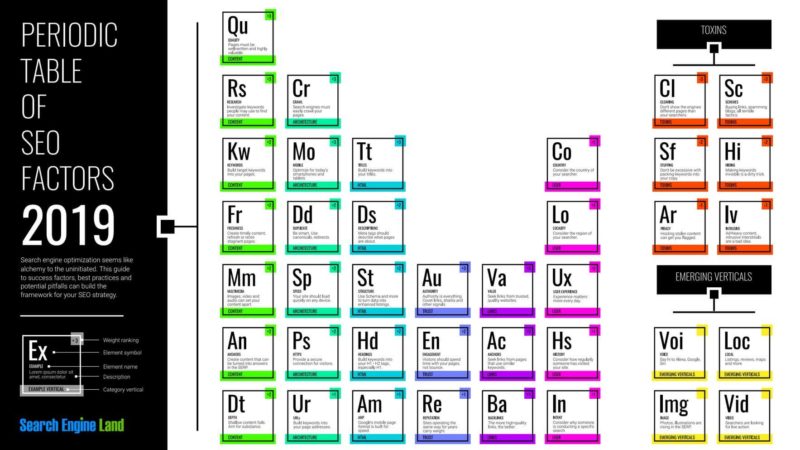SEO stands for “search engine optimization.” In simple terms, it means the process of improving your site to increase its visibility for relevant searches. The better visibility your pages have in search results, the more likely you are to garner attention and attract prospective and existing customers to your business.
How does SEO work?
Search engines such as Google and Bing use bots to crawl pages on the web, going from site to site, collecting information about those pages and putting them in an index. Next, algorithms analyze pages in the index, taking into account hundreds of ranking factors or signals, to determine the order pages should appear in the search results for a given query.
Search ranking factors can be considered proxies for aspects of the user experience. Our Periodic Table of SEO Factors organizes the factors into six main categories and weights each based on its overall importance to SEO. For example, content quality and keyword research are key factors of content optimization, and crawlability and mobile-friendliness are important site architecture factors.
The search algorithms are designed to surface relevant, authoritative pages and provide users with an efficient search experience. Optimizing your site and content with these factors in mind can help your pages rank higher in the search results.
Unlike paid search ads, you can’t pay search engines to get higher organic search rankings.
Why is SEO important for marketing?
SEO is a fundamental part of digital marketing because people conduct trillions of searches every year, often with commercial intent to find information about products and services. Search is often the primary source of digital traffic for brands and complements other marketing channels. Greater visibility and ranking higher in search results than your competition can have a material impact on your bottom line.
However, the search results have been evolving over the past few years to give users more direct answers and information that is more likely to keep users on the results page instead of driving them to other websites.
Also note, features like rich results and Knowledge Panels in the search results can increase visibility and provide users more information about your company directly in the results.
How can I learn SEO?
For a helpful dive into SEO, our Periodic Table Of SEO Factors will introduce you to all the key concepts you need to know, including the elements for successful on-page and off-page SEO, plus the “Toxins” or tactics that can hurt your rankings.
The table and accompanying report also look at the emerging verticals of search:
The Periodic Table of SEO Factors serves as the foundation of this Guide to SEO. Together, these resources will help you learn about SEO and inform your strategy for success.
Search Engine Land’s Guide To SEO
As a companion to our Periodic Table of SEO Factors, Search Engine Land’s Guide To SEO walks you through the fundamentals of optimizing for search so you can develop a solid strategy to drive organic traffic to your site.
In the guide below, we explain these factors in more depth, and highlight tactical tips from experts on search engine optimization that will help your website get more visitors from organic search.
- Chapter 1: Types Of Search Engine Success Factors: These are the on- and off-page factors that can affect your search rankings. We’ll also look at emerging search verticals and bad SEO tactics to avoid.
- Chapter 2: Content & Search Engine Success Factors: Keep these elements in mind to create high-quality content that search engines and your target audiences will love.
- Chapter 3: Site Architecture & Search Engine Success Factors: Let’s go behind-the-scenes and look at the aspects of your site that make it easy for search engines to access and influence user experience.
- Chapter 4: HTML Code & Search Engine Success Factors: HTML tags and structured data help organize information on your site and help search engines understand your content.
- Chapter 5: Trust, Authority, Expertise & Search Rankings: How your users engage with your site, as well its reputation and authority, helps search engines determine if it’s worthy of showing to users.
- Chapter 6: Link Building & Ranking In Search Engines: Why links are still important and what they tell search engines about your content.
- Chapter 7: Personalization & Search Engine Rankings: These are the user-specific elements, such as location and intent, that can affect the results users see.
- Chapter 8: Toxins & Search Engine Spam Penalties: Beware SEO “shortcuts.” Getting caught using these tactics can potentially result in a manual action penalty or even get your site delisted from the search index.
- Chapter 9: Emerging Verticals in Search: Voice, local, image and video search represent new ways for users to find what they’re looking for. While they each provide nuanced opportunities for brands, they’re still based on the fundamental principles of SEO.
Daily SEO News & Expert SEO Advice
In addition to daily news stories from our editorial staff, Search Engine Land publishes daily articles from expert contributors that cover SEO issues mainly from an in-the-trenches perspective.
Browse the SEO Channel for the most recent SEO news stories and expert columns. Sign up to receive
Search Engine Land’s SEO Library
In addition to covering SEO generally, Search Engine Land also has search engine optimization areas specifically for the major search engines:
Also within our library is the How To: SEO section is devoted to practical tips and tactics about search engine optimization.
We also have sub-categories, including:
- SEO: General
- SEO: Content and Writing
- SEO: Crawling and Robots
- SEO: Domains & URLs
- SEO: Duplicate Content
- SEO: Link Building
- SEO: Mobile Search
- SEO: Redirects & Moving Sites
- SEO: Spamming
- SEO: Sitemaps & Submitting URLs
- SEO: Titles & Descriptions
We also cover technical SEO topics, including an ongoing SEO for Developers series.



